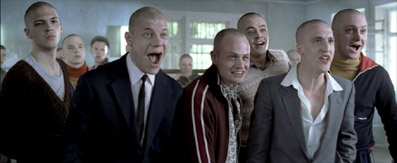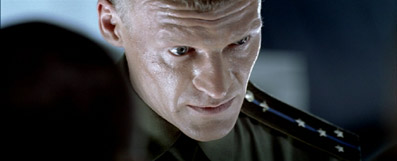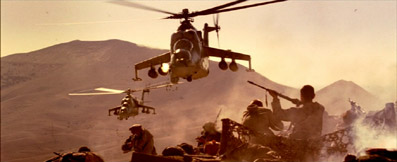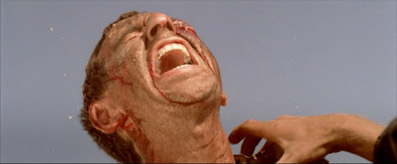|
9th
Company [9 rota] is one of those rare non-English
language films that is being pushed to an international
market and it's not hard to see why, as it has all the outward
appearance of a film designed from the ground up to reach
an audience far beyond national borders. In many ways it's
the Russian equivalent of a Hollywood war movie, and I mean
that in both the good and bad sense. It's spectacular when
it needs to be, has high production values and fierce action,
and it focuses on personal stories rather than the big picture.
But it also romanticises, is occasionally trite in its symbolism
and subtext, and tends to get loudly emotional when you want
it to get gritty. But despite these similarities with its
American cousins, I suspect the film was designed primarily
for a Russian audience, and that Hollywood techniques were employed
primarily to give it a fighting chance in a market dominated by imported
big budget spectaculars.
The
story kicks off in 1988 and follows the fortunes of a group
of young recruits who have elected to spend their military
service as part of the Soviet presence in Afghanistan, from
their training camp trials to a fierce battle with
Afghan fighters to defend a hilltop known as Height 3234.
It's worth noting that this was a real-life engagement that is still discussed by ex-soldiers
in reverential tones, and whose participants are regarded
(and some were decorated) as heroes.

There
are obvious parallels here with the American experience in
Vietnam, and it seems almost inevitable that American movies
dealing with the ordinary soldier's experience in that conflict should
prove a key influence on Bondarchuk's film. The division
of the story into two roughly equal chapters, the first set in the training
camp and the second on front line, recalls Full Metal Jacket,
complete with a later reunification scene between two of
the trainees, and a Warrant Officer whose aggressive brutality rivals Kubrick's Sgt.
Hartman. There are also echoes
of Platoon, from volatile Sgt. Barnes stand-in
Khokhol (played by director Bondarchuk and similarly kitted
out with two veteran cronies) and the punishment he dishes
out for sleeping on watch, to the let-it-all-hang-out party
at which the soldiers get drunk and bond to temporarily
forget their troubles.
A
low-budget film by Hollywood standards – the cost was approximately
$9 million – its larger scale battles were only made possible
through the cooperation of the Ukranian armed forces, which
collectively supplied the production with 30 T-64-B tanks,
20 MI-24 and MI-8 helicopters, 22 AN and MIG fighters, and
over 1,500 extras. But the main focus is on the soldiers
and their journey from raw recruits to battle-scared veterans,
and a good part of the movie's success or failure thus rests
on your engagement with them. For a non-Russian audience, this
can initially prove tricky, with their shaven heads and unfamiliar
names resulting in some possible identity confusion. Help
is at hand in the form of sometimes heavy-handed character
definition and a score that really likes to press the emotional
buttons, occasionally a push too far on scenes already soaked
in "FEEL for them" visuals – an overly triumphant
taking of a hill in training camp that is all joyous shouts
and slow motion hugs, or the decision to show a vulnerable
side of Dygalo by having him sit and weep in a beautifully
framed field of red flowers while the camera dolly-zooms in
and the music gets a lump in its throat. Even action scenes
come close to being hobbled by the score and the slow-mo,
which stomps clumsily into the middle of vicious gun battles
and bombing raids as if attempting to mythologize moments
whose power stems from their painful realism rather than
their spectacle or overwrought sense of tragedy.
When
it comes to military engagements, the violence is realistically
ferocious, and the deadly mayhem of a firefight is convincingly
portrayed. The final assault on Height 3234 is particularly
impressive, the hand-to-hand combat as brutal as anything
I've seen in some time, while a true sense of the confusion
and madness of battle is captured in the extraordinary sequence
in which the group comes under fire from one of its own helicopters.
But such bravura work is sometimes undermined by dips into
sledgehammer suggestion, which comes close to completely
scuppering one of the most remarkable and otherwise effective
scenes, as a talisman passed from one soldier to another
brings instant disaster for its former wearer and is fondled
meaningfully by its new owner as he ponders the man's fiery
demise. Yes, we get it.

The
non-combat scenes, of which there are many, do have their
moments. Giaconda may qualify as the dumbest soldier in
the platoon for leaving his post and following an Afghan
tribesman back to his village to trade, but it still makes
for nail-biting sequence. Another scene played solely for laughs,
in which Giaconda moulds plastic explosive into a penis
while a short-sighted instructor continues his lecture unaware
that the class is collapsing around him, is actually quite
funny, although more for actor Konstantin Kyukov's gentle clowning than the unrestrained giggling of his comrades.
One of the most effective scenes has a weary Captain
(an impressively low key turn by Alexei Serebryakov) deliver
a well written monologue to the largely disinterested soldiers
on the nature of Islamic state they are soon to enter, a
rare acknowledgement of an indigenous population as a people
with their own culture and beliefs. Elsewhere they serve
largely as background figures or the bogeymen enemy, much as the Viet
Cong were to Bravo Company's Marines, or the Zulus to the 24th
Regiment of Foot.
The
politics of the war itself are largely danced around in
favour of a more old-fashioned tale of male bonding, rites-of-passage education, and heroism in face of impossible odds. On this
score, 9th Company tends to hold its own,
pushing familiar generic buttons in largely efficient and
occasionally thoughtful fashion. But it's at its most interesting
in the more offbeat and unborrowed moments: the soldiers
in transit who stir from sleep to see a helicopter hovering
outside the rear door of their transport plane like an animal
peering curiously at potential prey; the unexpected payoff
when Giaconda is hauled before Dygalo for his plastic explosive
tomfoolery; a teasingly unexplored suggestion that some
officers may be selling weapons; the raid on another regiment's
food supplies that nearly ends in a shooting. Elsewhere,
elements feel like recycled lip service to genre expectations,
especially in the training scenes, right down to the toughen-him-up
fist fight initiated by Dygalo, and the soldier who passes up his last chance to leave
so that he
can keep a pledge to his comrades.
There's
a fair amount to enjoy and admire in 9th Company,
and for a first feature it's a seriously ambitious undertaking.
Mind you, it does seem to run in the family – director Fyodor
Bondarchuk's father Sergei was the man behind the country's
most expensive and ambitious film, War
and Peace. But it's an uneven journey that
paints in broad and often familiar strokes, an old-school
war movie given a modern makeover, complete with hyperactive
handheld camerawork and the post-Gladiator
45-degree shutter effect. It's certainly struck a chord
on home turf, becoming the highest grossing movie to date
in post-Communist Russia, and is assured a place in film
history as the first Russian film to deal with the war in Afghanistan.
But it's left to one of the real soldiers from the campaign
on this very DVD's extra features to ponder a key question
about the Soviet presence in Afghanistan that is never posed
here: should they have been there in there first place?
Framed
2.35:1 and anamorphically enhanced, the transfer here is,
as you'd hope, up there with the best Hollywood releases.
Contrast, detail and colour (which has been extensively
timed to give each location its own particular look) are
all excellent and the angled shutter flicker is coped
with well. The cinematography is often striking and is well
served by the transfer here, even if some interiors seem
lit for beauty rather than realism. A fine job.

There's
a choice between Russian 5.1 and DTS surround soundtracks
and the DTS track is the winner, having more punch and volume
and some thumping good LFE bass. There are a couple of sound
effects misdirected to the rear, but otherwise the surround
work is first rate, especially the battle scenes and anything
involving helicopters. The quality of the sound recording
and foley work is top notch.
This
is a 2 disc set and the extra features are all on disc 2.
Making
the Movie (38:53)
A busy and consistently interesting making-of documentary
that blends cast and crew interviews with brief biographies,
a useful history of the Soviet involvement in Afghanistan,
and plenty of behind-the-scenes footage. Bondarchuk come
across as energetic and enthusiastic, although
his on-set directions are riddled with censorship bleeps.
It was interesting to hear that the film character of Snow White – a seemingly
fanciful Madonna/Whore figure – was based on a real person.
Intriguingly, producer Yelena Yatsura suggests that the
film will be read differently by Russians and non-Russians.
I'd say she's on to something there.
Behind
the Scenes
A misleadingly labelled section that is actually a collection
of trailers. The Original Theatrical Trailer
(2:01) introduces the characters and then moves on to the
war footage, which is cut down for speed in the two Original
TV Spots (0:30 and 0:40). The Original
Theatrical Teaser (2:28) modifies the formula
and is rather well done, while the UK Theatrical
Trailer (1:34) is hampered by a rather dopey
voice-over.

20
Years Later (29:54)
A very worthwhile set of interviews with real 9th Company
veterans mixed with what appears to be genuine footage of
the Russian army in Afghanistan. Memories of their combat
experiences give some aspects of the film credibility that
might not otherwise be evident, and there's clear support
for a film that tries to show just what they went through.
But it's left to ex-soldier Iskander Islamgalievich to question
their presence in the country. "We entered mosques
with machine guns and flack jackets," he recalls. "Now
I understand why they hated us and wanted to kill us."
The
Premiere (8:54)
A not that interesting extra in which three unidentified
commentators, one of them very briefly, gush over the film's
qualities at and after the film's premiere.
War
movie buffs will find plenty to get happy about in 9th
Company, especially its battle scenes, whose use
of real helicopters, tanks, personnel and explosions have
a physicality and urgency that CG still can't match.
But there's little here that war movie veterans will not have seen before, and despite the comparison made
in the publicity and this review with key Vietnam war movies
of the 70s and 80s, 9th Company never quite
achieves their sublime blend of storytelling, gut punch emotional impact,
and art. The
DVD release from Contender, is fine, however, excelling
on picture and sound and boasting some interesting extra
features on the second disc. If you think 9th Company
is going to work for you then this DVD will not disappoint.
|